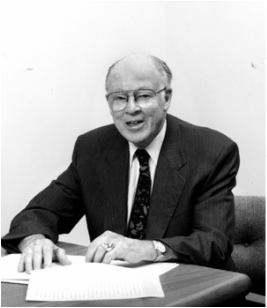
Everett Parker changed America and the world by leading the movement to hold broadcasters accountable to the public interest. Among many important accomplishments he dedicated his life to establishing diversity in the media and to open opportunities to minorities and women. He understood and taught us that how news, art and programming is created makes a difference in the end-product. It does matter if women and people of color are behind the camera, in the anchor chair or running the stations or even owning the stations.
The history of my relationship with Everett has taught me a lot about relationships, mentorship and love. I suspect that at first blush many of those who have encountered The Reverend Dr. Everett Parker (see a full biography here) might find the use of the word “love” in describing this rather erasable fellow a bit odd. But then probably not.
This is probably an appropriate time to mention my life before The Actual Dance. I am fond of referring to my “work” today as playwright and author as my “fourth age.” The “third age” being what is popularly referred to as what people do after they have retired or left their professional careers.
My own career started as a lawyer (University of Texas School of Law, class of 1970) and working in 1970 with Ralph Nader in the public interest law firm called “The Public Interest Research Group” or PIRG. After a stint in Army JAG and a law firm I returned in 1978 to take over an organization then called the National Citizens Committee for Broadcasting (NCCB) at the request of Nader and Nicholas Johnson. NCCB was a citizen membership organization devoted to “talking back to our telephone station” as Nick Johnson would call it. NCCB had emerged based on the work of Everett Parker in challenging the license of broadcasters and establishing the rule that broadcast licenses were temporary grants to operate on behalf of the viewers and listeners and therefore viewers and listeners could challenge how the broadcasters operated.
So this is when I met Everett. He wasn’t so happy to see this new guy on the block, a kid who really had no experience in communications advocacy and who was pretty good at getting on TV and his name in the paper just because Ralph Nader was involved. I have to admit I was winging it!
Everett was testing me. He wanted to be sure that I was not in this for myself; but rather for the sake of the cause. It took me a good while to win his confidence. What I find remarkable and therefore want to now focus on is how we ultimately ended up in what I like to call a loving relationship. I was able to meet and get to know Geneva, his wife. Everett, Geneva, Susan and I would occasionally connect in Washington after Everett retired and have dinner. He was always concerned about our family and when Susan go sick (see, The Actual Dance) he would always make sure I was attending to her.
There was a time in my career where my work became controversial among some of those in the “public interest community.” A lot of folks then (and still) see the world in “either or” terms, and my work seeking middle ground with business angered a number of advocates. Everett however reassured me and urged me on, believing that more gets done with building bridges than digging trenches. When the kitchen got hot for me I would often seek time with Everett who would not really turn down the heat as much as reassure me that it came with the territory and that I should stay the course and sweat it out.
There are many things that I am thankful to Everett for but the one that stands out is his introduction to Rev. Robert Chase, who was Everett’s third generation successor at the Office of Communication of the United Church of Christ. Everett somehow knew Bob and I would become great collaborators as we did and now deep friends. Bob eventually become the founding director of Intersections, the social justice arm of the Collegiate Church of New York. My “third age’ was to serve as a Senior Fellow at Intersections, where The Actual Dance was formed in collaboration with Artistic New Directions and others.
So in some ways, I am here today writing this blog, performing this play, doing the work that I was meant to do because Everett Parker ended up loving me and supporting me and introducing me to Bob.
Thank you Everett. I know I am not the only one who owes much of their own opportunity and success to his great spirit. My hope is that I can be as generous and loving to others as he was to me.

 RSS Feed
RSS Feed






